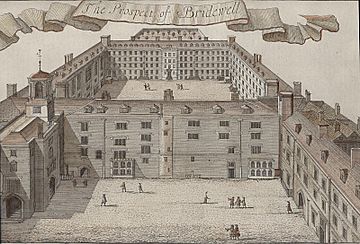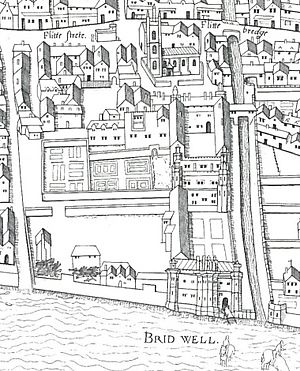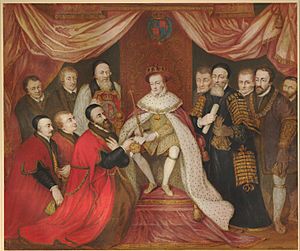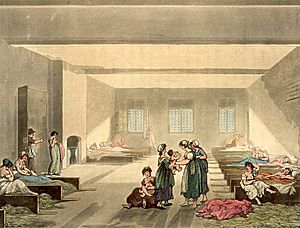Bridewell Palace facts for kids
Bridewell Palace in London was once a grand home for King Henry VIII. He lived there for about eight years early in his reign. Later, his son King Edward VI gave the palace to the City of London. It was used as a home for children who had no parents (orphanage) and a place to help people who were causing trouble.
Bridewell later became the first prison and poorhouse to have its own doctor. It was built near the River Fleet in the City of London, between Fleet Street and the River Thames. By 1556, part of it had become a jail known as Bridewell Prison. The prison closed in 1855, and the buildings were taken down in 1863–1864. The name "Bridewell" then became a common word for a jail in many English-speaking cities.
Contents
History of Bridewell Palace
A King's Home in London
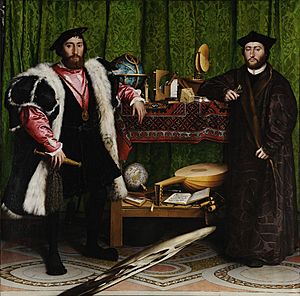
Bridewell Palace was built for King Henry VIII starting in 1515. It cost a lot of money, about £39,000, which was a huge sum back then! The palace was built where an old inn called St Bride's Inn used to be, right next to St Bride's Church. It stood on the banks of the River Fleet.
Important meetings happened here in 1528. These meetings were about King Henry VIII's wish to divorce Catherine of Aragon. Cardinal Thomas Wolsey was in charge of building the palace.
Bridewell Palace had two courtyards made of brick. The King's rooms were in the inner courtyard, spread over three floors. A large staircase led up to them from the outer courtyard. This palace was special because it was the first royal palace not to have a huge main hall. It also had a very long gallery, about 240 feet (73 meters) long, which connected the inner court to another area called Blackfriars.
After Cardinal Wolsey lost his power in 1530, the palace was rented out to the French ambassador from 1531 to 1539. It was during this time that Holbein painted his famous picture, The Ambassadors, right there in the palace.
From Royal Palace to Public Service
In 1553, King Edward VI gave the palace to the City of London. He wanted it to be used for two main things: to house children who had no homes and to help people who were causing trouble or needed guidance. The City of London officially took over in 1556. They turned the site into a prison, a hospital, and workshops. In 1557, Bridewell and Bethlem Royal Hospital (which was a hospital for people with mental health issues) were managed together.
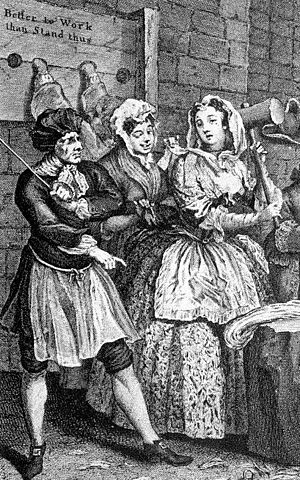
Most of the palace was destroyed in the Great Fire of London in 1666. But it was rebuilt soon after, in 1666–1667. In 1700, Bridewell became the first prison in England to have its own medical staff, including a doctor.
Over time, the prison also became a school. It was known by different names like Bridewell Royal Hospital or Bridewell Royal Hospital School. The prison part of Bridewell closed in 1855, and the buildings were torn down in 1863–1864. However, some prison activities continued on the site for a few more years. The school moved to a much larger place in Surrey in 1867. It changed its name to King Edward's School, Witley and celebrated its 450th anniversary in 2003.
Bridewell's Site Today
Today, you can still see a rebuilt gatehouse that looks like the original. It's part of an office building at 14 New Bridge Street. This gatehouse even has a carved picture of King Edward VI. The main area where the palace once stood now includes the Crowne Plaza Hotel and Unilever House. Unilever House was built in 1931. It stands near where the River Fleet used to meet the River Thames.
Images for kids
-
The Old Bridewell, a jail in New York City (1768–1838).
 | Kyle Baker |
 | Joseph Yoakum |
 | Laura Wheeler Waring |
 | Henry Ossawa Tanner |


